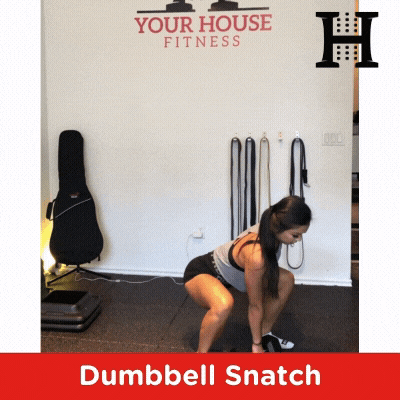Exercise Tutorial: Dumbbell Snatch
Table of Contents
What Is a Dumbbell Snatch
The Dumbbell Snatch (also known as the Single Arm Dumbbell Snatch) is a great full body unilateral exercise that improves full body strength, power and endurance, making this a great exercise to improve overall athletic performance. The snatch and its numerous variations can be a complex movement to get down, but the Dumbbell Snatch is a great starting point to build power before moving onto Olympic style lifts such as the Barbell Snatch.
How to Do a Dumbbell Snatch
Begin by standing with your feet slightly wider than shoulder width apart, with a dumbbell directly below you on the ground between your feet
Push your hips back and squat down into a position similar to a deadlift, hips down, chest and gaze up
Grip the center of the dumbbell with an overhand grip, elbows extended with your free arm hanging at your side
Pull your shoulders down and back and brace your core
Push with your legs, rapidly extending your hips and knees to draw the weight up of the floor, bringing the weight close your body as you come up
Once the weight gets to about hip level, begin pulling with your arm by bringing your elbow up and back and shrugging your shoulder to bring the weight up as high as you can
Once it’s reached its highest point, above shoulder level, turn your elbow under the dumbbell
Catch the weight at the bottom of an overhead squat with arm fully extended
Return to standing position by extending hips and knees with weight still overhead
Bring the weight back down in a similar fashion (bending at the elbow and lowering it back down) towards the floor returning to your starting squat position
Dumbbell Snatch Form
The Dumbbell Snatch is a complex dynamic exercise and as a result, proper form and technique is highly important. This exercise can be broken down into a squat and pull pattern. With any squat type movement, you want to ensure your knees are in line with your toes. We also want to ensure that we are maintaining a neutral spine, not rounding our back. Because this is a unilateral movement (single arm exercise) it is easy to become off balanced and laterally bend our backs to the side; we want to avoid this as much as possible.
Another thing to keep in mind is that we want to pull our shoulders down and back, keeping them engaged throughout the movement. When the weight is in an overhead position, it’s common to shrug the shoulders. We want to avoid this as much as possible and think about keeping our shoulders away from the ears.
The Dumbbell Snatch can be broken down into 3 phases: setup, pull and catch. During the start of the pull it’s important to note that the movement is powered by your lower body and not from the shoulders. Once the weight passes your knees and gets to about your hips, using the momentum you then start pulling with your arm.
Why Is a Dumbbell Snatch Useful
The Dumbbell Snatch is useful because it is a beginner friendly power movement. Not quite comfortable performing a barbell snatch yet? The Dumbbell Snatch is a great starting position. This variation of the Snatch requires less mobility, skill and technique to perform the exercise, making it a great exercise for lifters who are beginners or uncomfortable having the barbell overhead.
This exercise is also useful because it’s a great way to build explosive power, strength and metabolic endurance. This unilateral exercise (focus on one side of the body at a time) is a great way to reduce muscle imbalances and asymmetries. It’s also a highly functional, versatile and transferable movement. It can be performed single arm or double, with DB’s, KBs or a barbell. Once you have the motion down and can perform it in a cyclical motion, you can then perform more reps for longer durations. It will also transfer into other exercises like presses, swings and squats.
Dumbbell Snatch Benefits
Improve athletic performance
Improve muscular strength, power and endurance
Enhance cardiovascular fitness
Enhance stability and balance
Build muscle mass
Can be incorporated into HIIT workouts
Increase rate of force production
Dumbbell Snatch Muscles Worked
Dumbbell Snatch Variations
Alternating Dumbbell Snatch
The Alternating Dumbbell Snatch is performed the same way as the instructions listed above, the only difference is that we are switching arms between reps. When bringing the weight back down, once the weight reaches your hips, transfer the dumbbell from one hand to the other and prepare for the next rep with the new arm. This variation becomes more rhythmic, allowing clients to increase their working capacity and more aerobic in nature, thus improving cardiovascular and overall fitness.
Dumbbell Power Snatch
The Dumbbell Power Snatch is similar to the traditional snatch. The difference is that the power snatch involves catching the snatch/dumbbell in a partial overhead squat position rather than a full squat. You really power yourself upwards, by rapidly extending your hips and knees, feet come slightly off the ground in a mini jump and stick the landing.
Dumbbell Hang Snatch
The Dumbbell Hang Snatch is performed the same way as the original version with the main difference being that it is simply performed from a hang position with the dumbbell being held horizontally between your legs instead of from the ground.
Dumbbell Snatch Alternative
There are many exercises that are either similar to or perform half the movement of a dumbbell snatch. Here are the alternatives:
Dumbbell Snatch Progression
Before performing a Dumbbell Snatch, it's essential to master a few prerequisite movements or exercises. First, let's discuss the hip hinge. Understanding how to properly hip hinge ensures that you keep your back straight rather than rounding it. Another crucial skill is learning how to brace your core. Bracing your core muscles will help protect you from injuries. Practicing Front Raises is another exercise that helps you gauge how high you can lift, although the Dumbbell Snatch primarily utilizes the force of the hips, led by the shoulder and driven upward. These examples will aid in understanding the mechanics of the Dumbbell Snatch.



